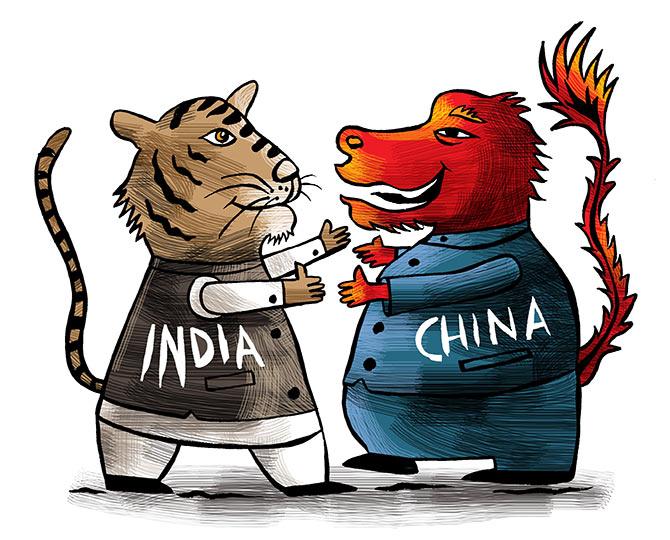 | « Back to article | Print this article |
While the Chinese dispute was with the EU, its decision to not pursue this will help the United States and India.
Besides, this could help Indian exporters replace Chinese goods in the EU and the US.

While China was carrying on with its military action along India’s border, it quietly withdrew from a different battle on the trade front.
It has not renewed its fight with the European Union on being recognised as a market economy.
This, at a time when it had lost its position to the United States of being India’s biggest trade partner in 2018-19.
China had been fighting a case in the World Trade Organis
ation (WTO) for seeking market economy status that would have legally insulated it from higher tariffs being imposed by other countries.
On June 15, China allowed its petition to lapse.
While the Chinese dispute was with the EU, its decision to not pursue this will help the United States and India.
Besides, this could help Indian exporters replace Chinese goods in the EU and the US.
The reluctance of China to pursue the dispute will strengthen the hands of investigating authorities globally to discard Chinese prices and costs and use surrogate data.
Each time, Chinese exporters would have to show that market economy conditions exist.
Senior officials said with withdrawal of the Chinese petition, India could impose stricter duties on imports from that country.
At the same time, it can tap the European and US markets for its products.
“After the ministry of commerce wrote to 200 Indian missions overseas in March this year, around 15-16 responded with a list of prospective importers of Indian products that could replace Chinese items.
"Since then, leather and garments are two areas where some progress has been made,” said an official.
India’s Directorate General of Trade Remedies (DGTR), the anti-dumping investigating authority, treated China as a non-market economy (NME) but after December 2016, when China completed 15 years of WTO membership, the approach changed slightly.
The NME questionnaire is no longer sent to Chinese exporters but they have to undergo a strict test for establishing that they operate in market economy conditions.
Officials said DGTR could now feel more confident in using the strict test in anti-dumping investigations.
If the Chinese exporters fail to meet the test standards, then the Chinese costs and prices can be discarded and surrogate costs and prices used resulting in higher anti-dumping duty.
India was reviewing the anti-dumping duty on 25 items exported from China when the coronavirus (Covid-19) pandemic stuck earlier this year.
“The border exchange does not have impact on imposition of anti-dumping duties simply because the investigations follow a particular process.
"However, at this point, the government is looking at strengthening domestic manufacturing and make good of anti-China sentiments in Europe and the US to further Indian exports,” said an official.
India’s anti-dumping rules have a provision regarding a country being treated as NME by the investigating authority in India or any other WTO member country in the preceding three years.
The presumption of NME can be rebutted if the exporter submits evidence on prices, costs and inputs, raw materials, cost of technology and labour, among others.
Also, sales must be made without state interference and reflect market values.
Production costs and financial situation are not subject to significant distortions carried over from former NME system, especially in relation to depreciation of assets, write-offs and barter trade, among others.
Such firms are subject to bankruptcy and property laws; and exchange rate conversions are carried out at the market rate.
Section 15 of China’s Protocol of Accession to the WTO conferred a right to WTO members to treat China as an NME in anti-dumping investigations.
This enabled investigating authorities to reject prices and costs offered by Chinese exporters and use a surrogate price in anti-dumping investigations.
This could result in imposition of a high anti-dumping duty on Chinese imports into other countries over situations where Chinese costs and prices are used in the dumping calculations.
Section 15, according to China, gave countries the flexibility for treating it as an NME only for 15 years after China’s accession to the WTO, which meant only till December 11, 2016.
China wanted this NME methodology to be terminated on expiry of the 15-year period. On the other hand, other countries, including the ones in EU and the US, said Section 15 continued to permit treatment of China as an NME for the purposes of anti-dumping investigation.
China raised the dispute in December 2016 but in June 2019, it requested the dispute panel to suspend its work.
Under the rules of the Dispute Settlement Understanding, the authority of the panel to rule in this dispute has lapsed.
Though China did not lose the dispute, the fact that it did not request the dispute panel to resume work would point in the direction of China not prevailing in the dispute.